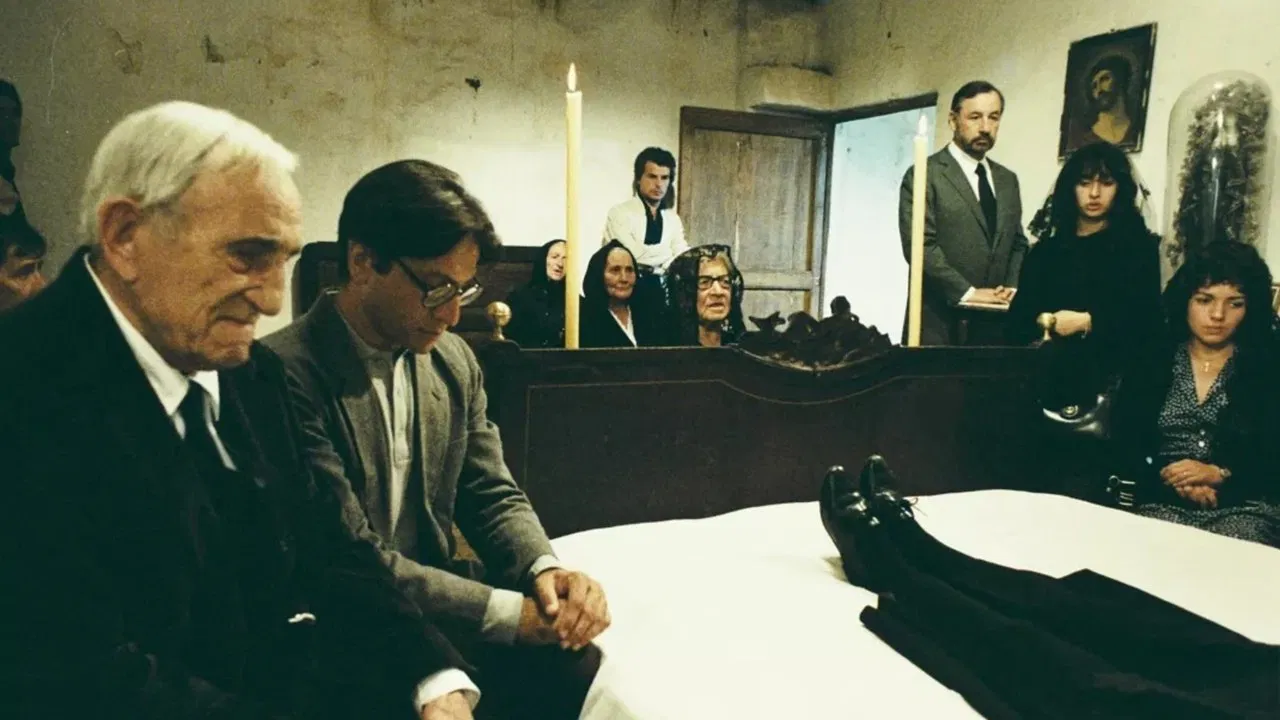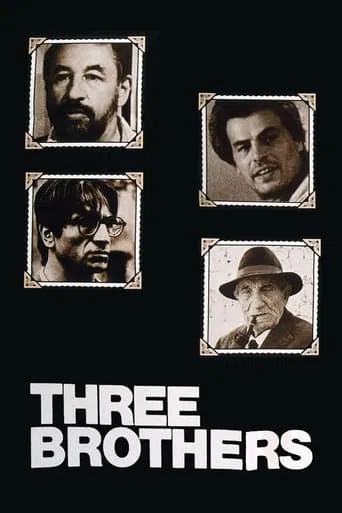

recommended
... View MorePeople are voting emotionally.
... View MoreA brilliant film that helped define a genre
... View MoreEasily the biggest piece of Right wing non sense propaganda I ever saw.
... View MoreThis Italian film is one I read about in the book 1001 Movies You Must See Before You Die, the title made it obvious what the main subject was, but the story I did not know, I hoped it would be good, directed by Francesco Rosi (Christ Stopped at Eboli). Basically in southern Italy, the matriarch of the Giuranna family dies in the farmhouse, her husband summons their three sons from Rome to prepare for the funeral, each of whom are facing difficult personal problems. The first son, Raffaele (Philippe Noiret), is a courtroom judge presiding over a terrorism case, at risk of assassination he is in constant fear for his life. The second son, Rocco (Vittorio Mezzogiorno), is a religious man who lives in Naples, he works as a counsellor at a correctional institute for boys, hoping to achieve his dream of helping troubled teenagers. The third son, Nicola (Michele Placido), lives in Turin and works as a factory worker, he is involves in a labour dispute and his marriage is failing. Each of the men grieve for the loss of their mother in their own way, while also grappling with the other emotional issues that are pressing on them. The three brothers encounter the past and contemplate things that may come: Raffaele imagines himself dying, Rocco dreams of helping youths of Naples out of violence, drugs and corruption, and Nicola pictures himself and his wife and embracing, meanwhile the old man and his granddaughter take care of the farm and grieve together. Also starring Charles Vanel as Donato Giuranna and Andréa Ferréol as Raffaele's Wife. I understood the main plot of the story with a family of three brothers and the father brought together for the funeral of the mother, but I agree with critics it is perhaps overloaded with other topics about age gaps, marriage trouble, terrorism, politics, and of course death, overall it certainly engages you enough however that makes an interesting enough drama. Worth watching!
... View MoreAnd it tries very hard ... unfortunately it never truly delivers. The story as it is has many facets that are interesting, but it never really get's interesting for the viewer. While the actors seem to try to make the best of it, you never really comprehend, where all this is trying to go, what it tries to tell you. It's a shame, because it would've been a really good movie ...The downfall might be the structure (I can't really put my finger on it). Different time-lines that do collide, some interestingly some not so much. Plot threads opened, some resolved in an unsatisfying way and issues come and go leaving you a bit uncaring about the characters and their problems ... Well it's independent, but I still had higher hopes from this movie.
... View MoreThe disturbing opening scene is a nightmare that Rocco Giuranna is having. The rats that are scavenging a trash site seem to herald what he and his two brothers will face as the three come together because the death of their mother. Rocco is a social worker living in a state reformatory where he is in charge of young boys that are in the institution to be re-educated. Unfortunately, they will probably will go to be hard criminals when they are released from the Naples correctional facility.Raffaele, the older brother, is a judge in Rome. He has been asked to preside over an important case coming to trial that involves local terrorists. Italy was living harsh days at the time and judges were the target for paid assassins or revolutionaries with an agenda for eliminating those that dared to speak against them. The upcoming trial has a profound effect on Raffaele's wife, who knows it probably means the death of her husband.The third brother, Nicola, is a factory worker. Like his brothers, he fled the poor South of Italy in search for a better future in Torino. What he finds is unhappiness as he rebels against the firm he feels is enslaving him and his co-workers. His marriage has suffered because his wife has cheated on him and they are separated.It is at this junction that all three brothers are summoned to come home as their mother has died. Donato, the older father, is lost, as he ponders what is going to become of him. His memories of happier times, with the woman he adored, keep flooding back to him as his three sons come home to mourn for their loss. The three brothers, in turn, are haunted by their own memories of their present lives and their youth in the small town in Puglia before they left home.Francesco Rosi, adapted Andrei Platonov's novel "The Third Son", together with Tonino Guerra, one of the best writers in the Italian cinema. Mr. Rosi, a director who shows an affinity for presenting ordinary people in difficult situations in their lives, scored a big success with this film. He knows these characters. The director makes an enormous contribution in the way he deals with the emotions of the principals in this film about the love of the land, on the one hand of Donato, the father, and the restlessness of the three sons that abandoned their birth place in search of a better living. Rosi's triumph is in showing us that ultimately, it's Donato, the father, the one that stayed behind who is the one that lived a better life than their three sons.The director achieves a triumph in the way he directed the four principals in the film. Philippe Noiret, Michele Placido, and Vittorio Mezzogiorno do an excellent job in bringing to life, Raffaele, Nicola and Rocco. It is however Charles Vanel, the veteran French actor who stays with the viewer because of his exquisite portrayal of the older Donato. Mr. Vanel hardly utters a word throughout the movie, yet, his presence is so powerful that at times one tends to forget the others. Mr. Vanel's Donato is one of the best creations in his long film career in France.Pasqualino DiSantis' cinematography captures the essence of what Francesco Rosi was looking for. The director and his photographer were well attuned indeed. Ruggero Mastroianni's film editing shows once more his elegant style of putting the material together. Francesco Rosi is the one that brought all the elements together in this dramatic and satisfactory film.
... View MoreI've always been very interested in Italy, its culture, its architecture, its cinema,... and that's why I will not let a chance go by to watch an Italian movie, because most of the time you'll see a fine combination of all these factors in it. So far I've already seen several Italian films, including some fine award winners like "La Meglio gioventù" and "La Stanza del figlio", and I can't remember that I've seen many that I really didn't like."Tre fratelli" tells the story of three brothers who return to the farmhouse in southern Italy where they grew up after the death of their mother. Except for their family ties, the three adult men don't really seem to have anything in common. Raffaele is a happily married judge in Rome who risks to be assassinated for a political case he hasn't even accepted yet, Rocco is a single social worker who works at a correctional institute for boys in Naples and Nicola is a radical factory worker from Turin who lives separated from his wife and who is involved in labor disputes and therefor risks to be fired. Together they have several discussions about the meaning of life, marriage terrorism, the mafia,... while their father grieves over the loss of his wife with his young granddaughter, who he also teaches something about life in the countryside.Perhaps not everybody agrees with me, but this movie reminded me a lot of "La Meglio gioventù". And you can definitely see that as a compliment, because I really loved that movie a lot. This movie too showed how several family members, who don't seem to have much in common at first, make the best of their lives together, with the current social and political situation in Italy on the background. The main difference is that this movie only focuses on the 1980's, while the story of the other movie started in 1966 and ended in 2000.Philippe Noiret, Michele Placido and Vittorio Mezzogiorno are very nice to watch as the brothers and Charles Vanel was very good as their father, but if I have to chose one actor who really surprised me, then it must be the young Marta Zoffoli. Despite her young age, she gave away a very fine performance and in my opinion she was the true star of the movie.Overall this is a very nice drama that certainly should get a lot more attention than what it has received so far. When I see that it has only received 130 votes until now, I truly believe that this movie doesn't get the audience that it deserves. It has a good story and some very fine acting to offer, the decors are nice and thanks to Francesco Rosi, the director and co-writer of this movie, everything has been brought together into one solid movie. I give this movie at least a 7.5/10 and hope that many more will see it.
... View More